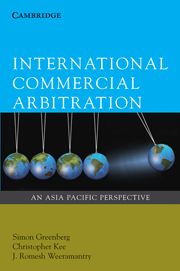Book contents
- Frontmatter
- Contents
- Foreword
- Preface
- Table of Cases
- Table of Statutes
- 1 Introduction to international arbitration and its place in the Asia-Pacific
- 2 Law governing the arbitration and role of the seat
- 3 Applicable substantive law
- 4 Arbitration agreement
- 5 Arbitral jurisdiction
- 6 The arbitral tribunal
- 7 Procedure and evidence
- 8 The award
- 9 The award
- 10 Investment treaty arbitration
- Appendix 1 Asia-Pacific arbitral institutions at a glance
- Appendix 2 Selected arbitral institutions
- Appendix 3 List of UNCITRAL Model Law countries
- Appendix 4 List of parties to the New York Convention 1958
- Appendix 5 Selected list of Asia-Pacific arbitration legislation and instruments
- Glossary
- Index
2 - Law governing the arbitration and role of the seat
Published online by Cambridge University Press: 05 June 2012
- Frontmatter
- Contents
- Foreword
- Preface
- Table of Cases
- Table of Statutes
- 1 Introduction to international arbitration and its place in the Asia-Pacific
- 2 Law governing the arbitration and role of the seat
- 3 Applicable substantive law
- 4 Arbitration agreement
- 5 Arbitral jurisdiction
- 6 The arbitral tribunal
- 7 Procedure and evidence
- 8 The award
- 9 The award
- 10 Investment treaty arbitration
- Appendix 1 Asia-Pacific arbitral institutions at a glance
- Appendix 2 Selected arbitral institutions
- Appendix 3 List of UNCITRAL Model Law countries
- Appendix 4 List of parties to the New York Convention 1958
- Appendix 5 Selected list of Asia-Pacific arbitration legislation and instruments
- Glossary
- Index
Summary
Introduction
This chapter examines how, why and on what basis the process of international commercial arbitration is legally permitted. It also covers the main practical functions of the seat of arbitration.
The seat (or place) of arbitration is the jurisdiction in which an arbitration takes place legally. This must be distinguished from the location of any physical hearings or meetings that are held as part of the arbitration proceedings. The hearings or meetings do not necessarily have to be held at the seat of arbitration.
It is essential to appreciate the connection between arbitration proceedings and the laws of the seat of arbitration. The different theories relating to this connection arise from the delicate interplay between a state's powers (particularly state judicial powers), an arbitral tribunal's powers and the freedom of parties to choose how their disputes are determined. At times these interests may conflict and there is potential for the law and/or the courts of the seat of arbitration to constrain the flexible and pragmatic qualities of arbitration. To gain a deeper understanding of these conflicting circumstances, recourse to theory and legal doctrine is unavoidable.
In Section 2 we discuss whether to use the term ‘seat’ or ‘place’ referring to the jurisdiction to which the arbitration is legally attached. In this book we mainly use ‘seat.’ In Section 3 we distinguish between the seat of arbitration and the place or venue of hearings. Section 4 examines the different laws and rules which regulate international arbitration proceedings.
- Type
- Chapter
- Information
- International Commercial ArbitrationAn Asia-Pacific Perspective, pp. 54 - 95Publisher: Cambridge University PressPrint publication year: 2010

